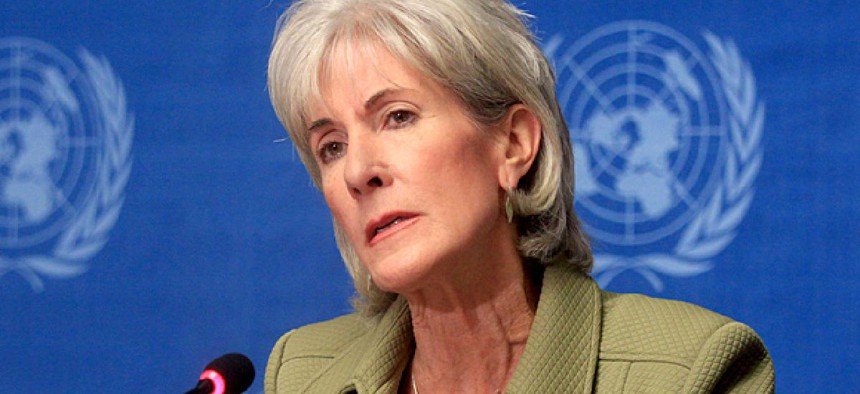
Kathleen Sebelius, Secretary of Health and Human Services Flickr user US Mission Geneva
HHS ushers in eight more states for health exchanges
With some governors resisting, total participation rises to 19 plus D.C.
Health and Human Services Secretary Kathleen Sebelius on Thursday announced that eight additional states have satisfied regulatory criteria in their efforts to establish health insurance exchanges under the 2010 Affordable Care Act.
That brings to 19, plus the District of Columbia, the number that have been conditionally approved to partially or fully run their marketplaces, or state-based exchanges. HHS also issued refined guidance to the remaining states, which have until Feb. 15, 2013, to apply to implement a hybrid approach called a state partnership exchange.
Under the law, states may create their own exchanges -- or “marketplaces” that offer consumers a choice among competing private health plans -- or the federal government will facilitate one for them so that all 50 states offer coverage. Because the law known informally as “Obamacare” is politically controversial, many Republican governors and legislatures have declined to prepare for the exchanges, which go live in 2014.
“From the beginning, this process was guided by a belief that states know their own needs better than anyone else,” Sebelius said in a conference call with reporters. “It’s encouraging to see so many moving forward to do just that. No matter what state Americans live in, they now will have a better health coverage option, and the marketplaces being built will usher in a brand new day.”
No longer will consumers have to study the fine print of insurance policies looking for loopholes, she added. “The right plan is less costly and less complicated than ever before. We will work with states every step of the way to make these marketplaces a reality.”
The states newly conditionally approved for state-based exchanges are California, Hawaii, Idaho, Nevada, New Mexico, Vermont and Utah. Arkansas is conditionally approved to operate a state partnership exchange.
Last year, approval for a state-based exchange was given to Colorado, Connecticut, the District of Columbia, Kentucky, Massachusetts, Maryland, Minnesota, New York, Oregon, Rhode Island and Washington. Delaware was OK'd for a state partnership exchange.
Conditional approval, said Gary Cohen, director of HHS’ Center for Consumer Information and Insurance Oversight, means the state’s plan is “neither approved nor denied” while the department continues overseeing each state’s ongoing activities in managing the marketplaces and helping consumers. Individuals, families and businesses who seek insurance under the law may be eligible for tax credits.
“There will be future opportunities to become a state-based exchange,” Cohen added, describing an annual process that means states could apply by this November to stand up an exchange by 2015. States that opt for the hybrid approach could pursue full exchanges later on, the guidance says.







